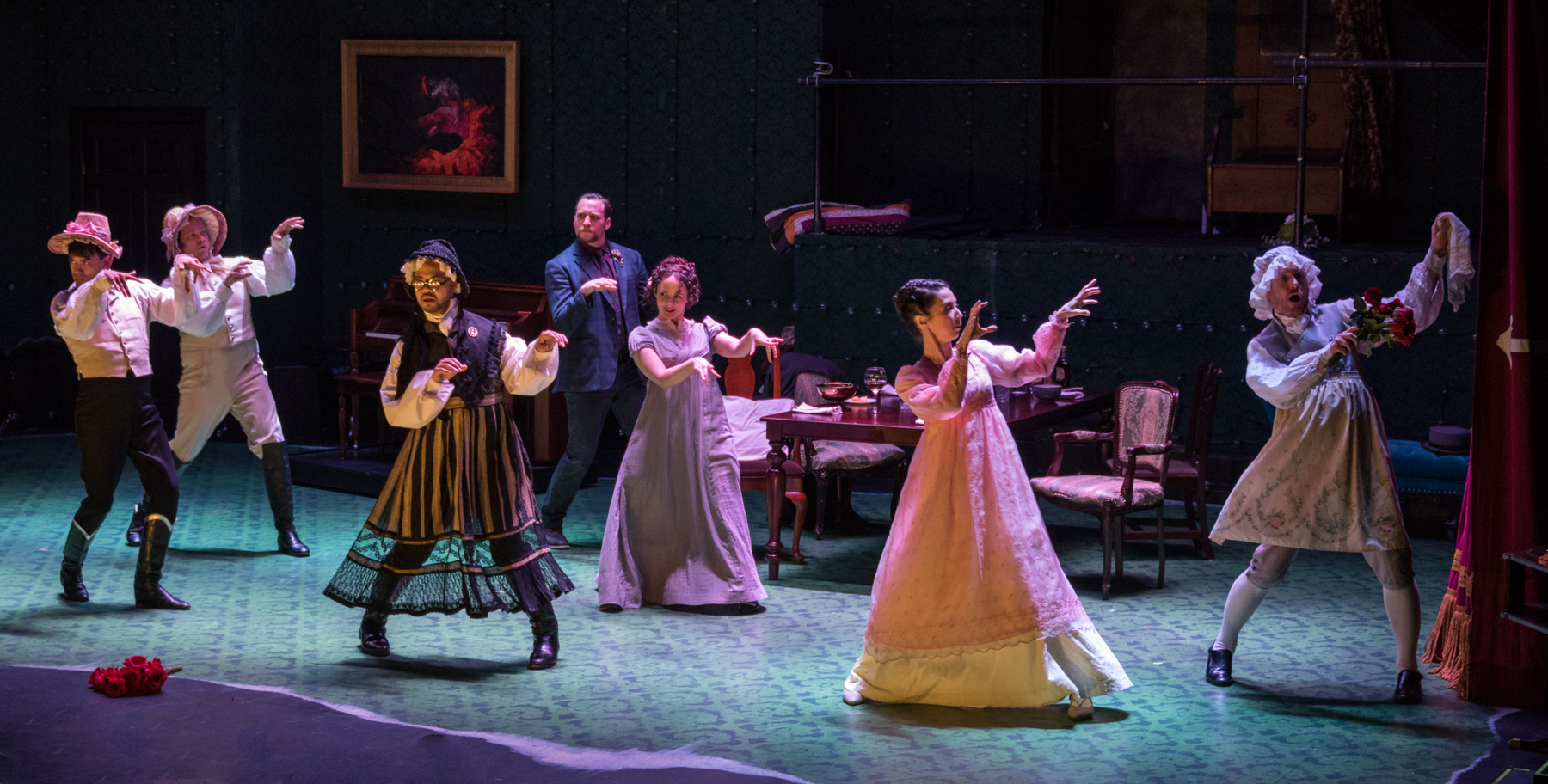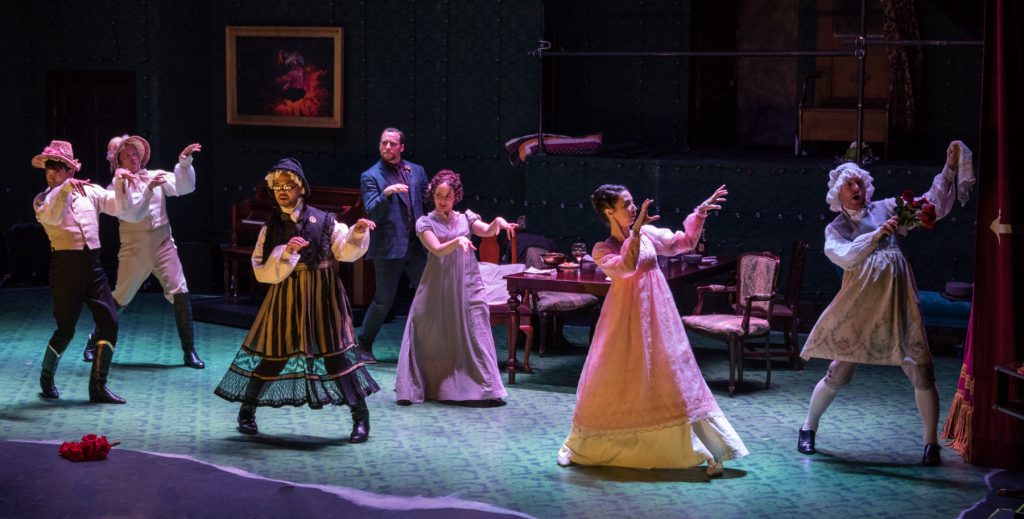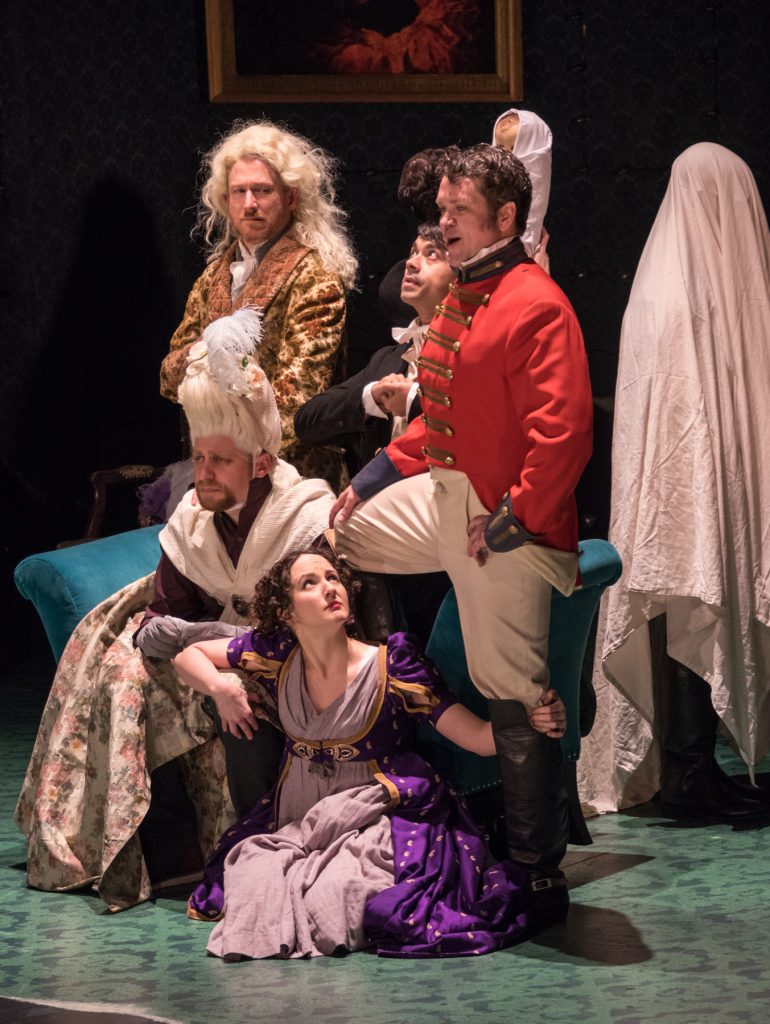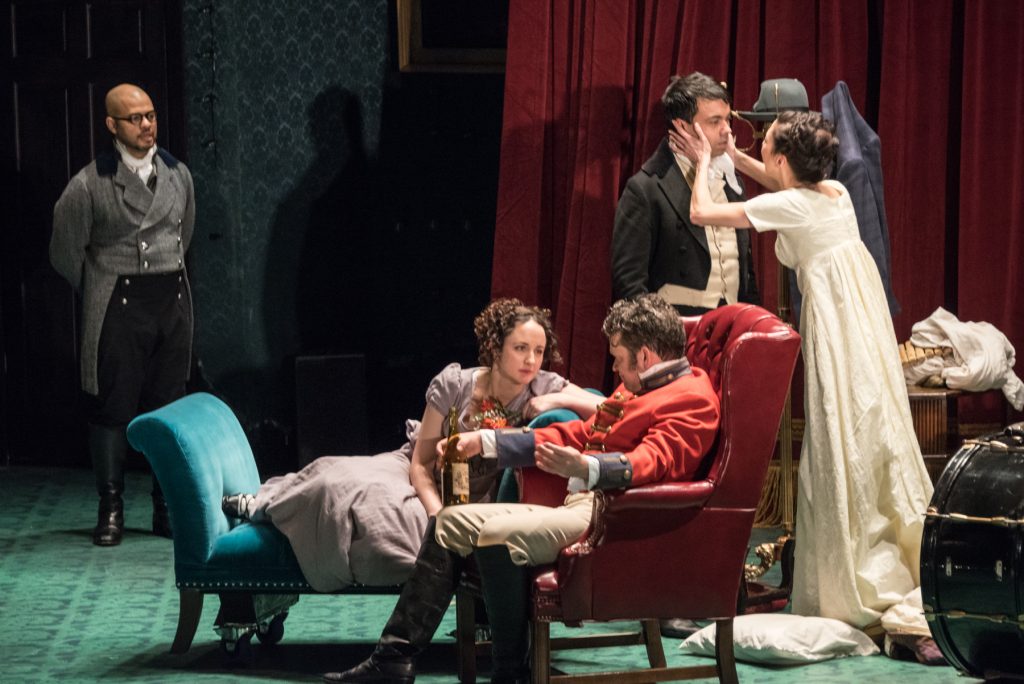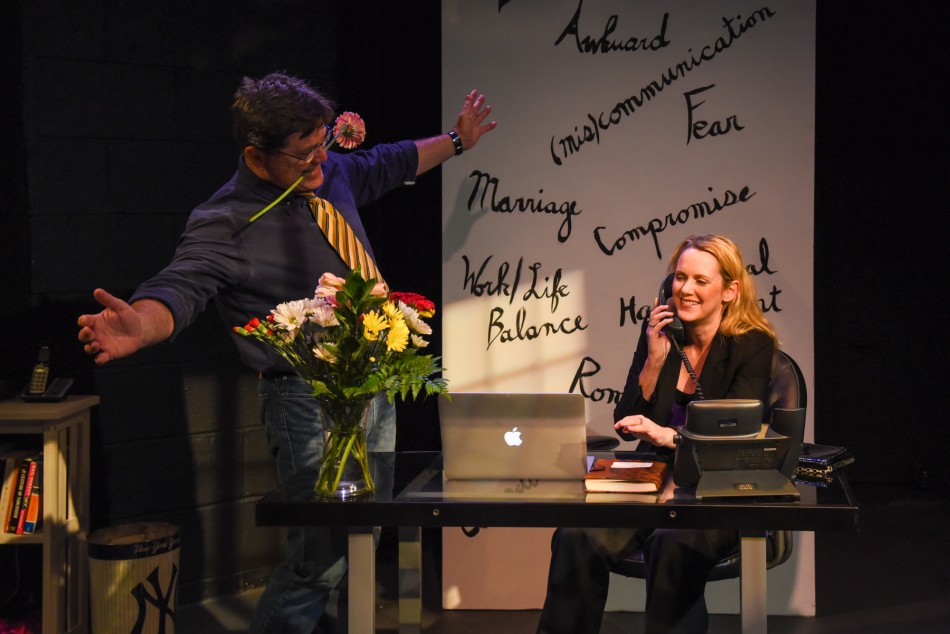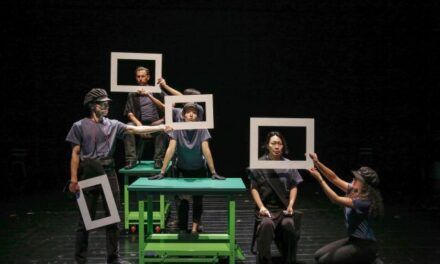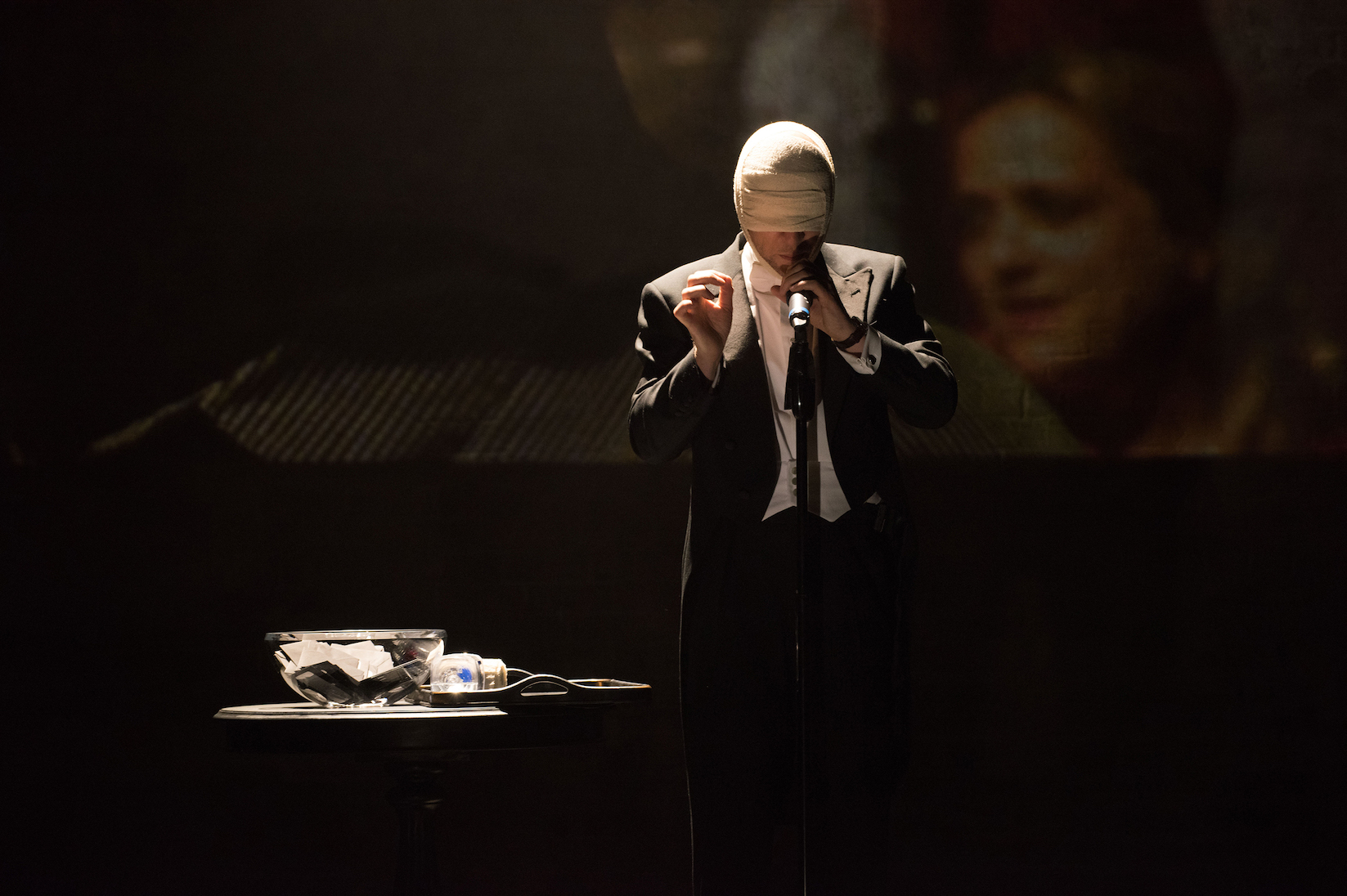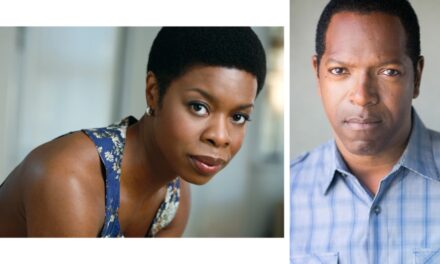by Myra Chanin
The world premiere of Vanity Fair, Kate Hamill’s adaption of Thackeray’s satirical novel, as directed by Eric Tucker, is a great and glorious, equal parts cabaret, circus and non-judgmental morality play, which traces the lives and matrimonial expeditions of one baseborn and one hoity-toity English lass during the years of the Napoleonic wars.
I was hooked from the moment the manager (the immensely talented Zachary Fine) stepped on stage, successfully whisked his hat onto the neck of a costumed (stage right) mannequin and declared: “This is Vanity Fair, and it is not a moral place. Nor is it often a merry one, for all of its pageantry and noise. But we’ve scraped together the best bits to entertain you! We have scenes of all sorts: scenes of high life and some of very low indeed; lofty speeches, dreadful combats, lovemaking for the sentimental, a bit of light comic business – and the whole accompanied by spectacular set dressings – well, the best we can afford.”
After speaking directly to an audience member. “Oops. I see a face falling already. Came here unwillingly, sir? Dragged along by the wife, I suppose. I wager you’ll fall asleep during the first act – this whole row will suffer from your snoring … “ Then gets back to his point: “The people of Vanity Fair are very fallible indeed. It is easy to sit in judgment. But the right path is often unclear to those still living in the Fair, when you consider the game’s great question: how do you get what you want? What do you want?”
He draws back the curtain and reveals four remarkable actors (Brad Heberlee, Tom O’Keefe, Ryan Quinn and Debargo Sanyal (who like the Manager all play at least three roles, either male or female) plus Kate Hamill and Joey Parsons who portray the two leading female roles. They are all standing still as statues until the Manager brings them to life by giving each one a gold coin. The answers they all give to his question about their desires vary: one by one they reply: honor, glory, redemption, love, respect. Then in unison they utter the common denominator. every one of them wants money. In addition, a-besotted-with-love him, says he wants a specific her. That specific her wants a him, but, alas, not the him that wants her. Finally Becky Sharp, the anti-ingénue speaks out loud and clear and pulls no punches. She, who has nothing, wants everything!
Basically, the story contrasts the lives of the two school chums: The born with a silver spoon in her mouth Emmy Sedley (Joey Parsons) who starts out with lots of advantages and tries to follow the systems set for her to succeed and the subjugated charity pupil Becky Sharp (Kate Hamill) who begins at the absolute bottom and is determined, rules be hanged, to get to her goals. Becky is punished for reaching too far. Emmy is punished for being too acquiescent. Their journeys across the same terrain are too complicated for me to detail. Go see the play. It’s fun, interesting and often even touching. If you insist on knowing the entire plot in advance, check it out on Wikipedia.
What did you expect? Vanity Fair is life.
Kate Hamill, the adaptor and star, and Eric Tucker, the director, are a smashing duo, as in turning classic stories into theatrical smash hits. That’s exactly what they did with their previous merger, Off-Broadway’s Sense and Sensibility, which became an extended over and over again downtown triumph. Kate Hamill starred in that also and who can blame her? If you’ve labored long and hard compressing a 67-chapter novel into a spectacular two-and-a-half hour theatrical event, why on earth would you allow a rival to steal the starring role? Psst. FYI Would you believe that in response to popular demand Vanity Fair performances have been extended, and that was before the play opened?
Sandra Goldmark’s set was beyond spectacular. It’s actually simply, functionally and cleverly magnificent in every sense of those words. Initially it consists of a few artifacts and elaborately clothed mannequins on both wings of the stage that hint at future action and a mysterious, mobile, flexible red curtain attached to an overhead oval rod encircling the entire stage like the curtains that encircled bathtub showers back in the day. The furnishing are sparse – some chairs, a table, a piano –bright, colorful and easily whisked with a seated performer wherever each one is needed.
Valerie Therese Bart’s costumes were ingenious. Becky’s basic slave grey gown is enhanced by purple and gold satin glad rags as she climbs the ladder. Emmy’s fall from grace requires her to discard her red topper and wander around in her pure white shift. The Manager becomes the moneyed Miss Matilda Crawley by stripping down to his undershirt and trousers, concealing his nether parts under a stiff bouffant skirt and adding a platinum wig.
I also quite taken with Carmel Dean’s plonky, gloomy but rhythmic minor key waltzes, the mood reminiscent of Sibelius’s triste valses.
I thought the second act could have been cut slightly. As for Eric Tucker’s direction, Triple Wows! for turning an ancient classic into a fun show with an considerable undercoating of content.
Vanity Fair. Through May 14 at The Pearl Theatre (555 West 42 Street, between Tenth and Eleventh Avenues). Run time: 2 hours 45 minutes. www.pearltheatre.org
Photos: Brad Heberlee


